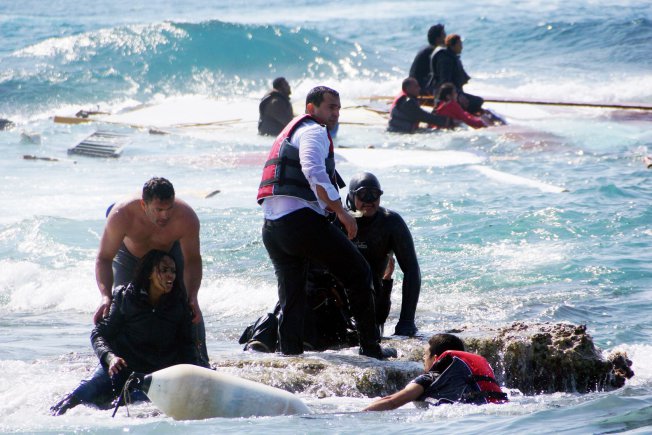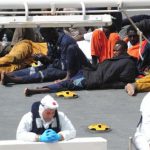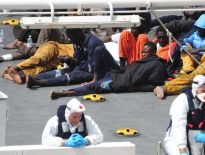Leaders will hold another emergency meeting Thursday to address the hundreds who are dying while trying to reach European shores.

After months of calls from humanitarian groups, the European Union has been forced to reconsider its response to the worsening Mediterranean migrant crisis that has caused hundreds of deaths in the past week alone. A ship that capsized Sunday carried as many as 950 people, the vast majority of whom are feared dead, and three other rescue operations were reportedly underway Monday. The situation spurred an emergency meeting of European interior and foreign ministers in Luxembourg.
“We need to show that same collective European sense of urgency we have consistently shown in reacting in times of crisis, European Commission officials said in a statement following the emergency meeting. The dire situation in the Mediterranean is not a new nor a passing reality.
An estimated 1,600 migrants have died at sea so far this year, though officials can’t say for certain because of the nature of the illegal human smuggling operation. Only 28 survivors of Sunday’s incident had been located as of Monday, and their accounts of how many people were aboard the roughly 70-foot boat varied from 600 to 950.
The ministers released a 10-point plan of immediate actions to be taken to accelerate the response to the crisis. The plan, which includes increasing financial resources and assets dedicated to search and rescue operations in the Mediterranean Sea, will be further discussed Thursday at an extraordinary session of the European Council.
I do not expect any quick-fix solutions to the root causes of migration – because there are none. Had they existed, we would have used them long ago, European Council President Donald Tusk said when announcing Thursday’s meeting. But I do expect that the commission and the European External Action Service will present options for immediate action. And I do expect member states will contribute immediately.
The current program, Operation Triton, is run by EU border organization Frontex, but does not have the resources to match the previous Mare Nostrum rescue program. That operation was run by the Italian government at a cost of 9 million euros per month and was discontinued last fall because the country could not maintain the expense.
Authorities hoped that fewer boats would set out on the journey if they knew there weren’t as many European ships ready to respond to distress calls, but so far the number of people taking the risky trips in unseaworthy vessels has only increased. In 2013, 42,000 migrants arrived in Italy via boat, but in 2014, 170,000 made the journey.
Italy has borne the brunt of the crisis because its coast is closest to the Libyan shores where the majority of smuggling networks run their operations, and Italian Prime Minister Matteo Renzi joined Tusk in requesting that the region’s leaders meet.
The 10-point plan also calls for increased efforts to capture and destroy boats used by smuggling networks to transport migrants. Smugglers often disembark passengers in smaller boats before they reach shore in an effort to evade authorities near the coast. The networks hope to return vessels back to Libya to pick up another group of migrants who arrive there from Syria and sub-Saharan Africa in hopes of making better lives in Europe.
The European Commission additionally said resources must be allocated towards emergency relocation, processing asylum applications and engaging with countries where migrants originate their journeys.
Many humanitarian organizations have long been calling for a more coordinated response to the crisis, saying European authorities were not doing enough to address the mass drownings. Amnesty International said the plan released Monday was a positive step away from the previous policy of denial and empty rhetoric, but must result in a comprehensive search-and-rescue operation with both sea and air support.
Finally a sense of urgency has mobilized European governments and EU institutions to act – at least on paper, said Iverna McGowan acting director of Amnesty International’s European Institutions Office. Thursday’s emergency summit will be the litmus test for Europe’s commitment to save lives in the Mediterranean. Words must now turn into concrete action specifically in the form of a European multi-nation and robust search and rescue operation.





